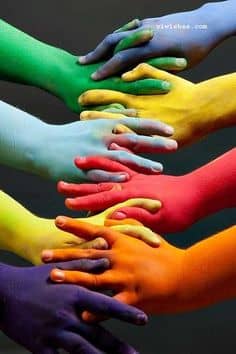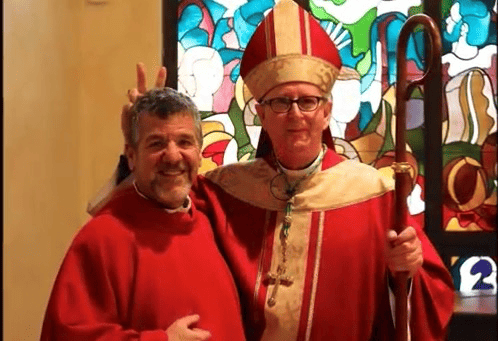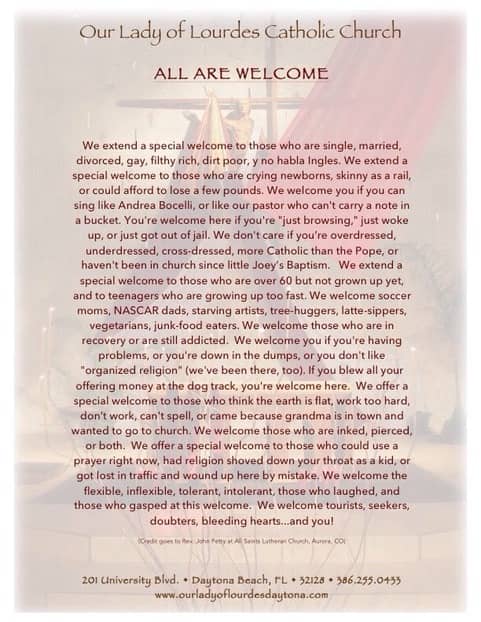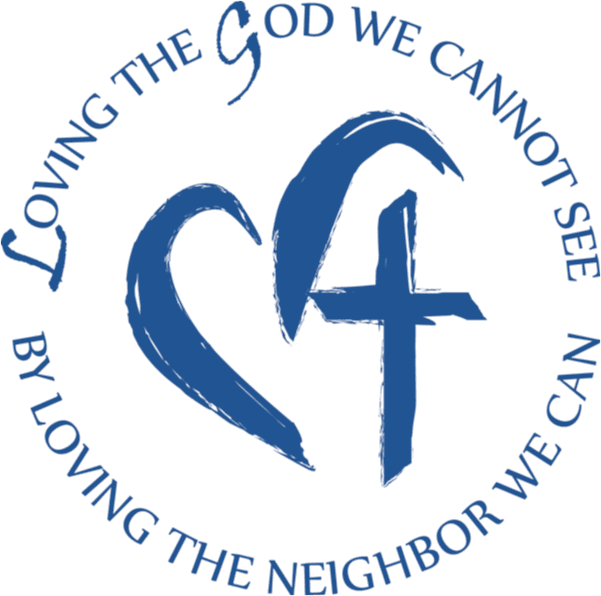We are a parish in Daytona Beach, Fla., that believes all are welcome—and all means all.
Many years ago, we decided to come up with a concise, easy-to-remember mission statement for our parish: “To love the God we cannot see by loving the neighbor we can.” We then felt it necessary to define “love.” We decided that for us, love meant “to will the good of the other and act on it.” With this in mind, we believe that we as a parish have two charisms: “radical hospitality” and “building the Kingdom of God through social justice.” Our outreach to the LGBTQ community stems from these core values and beliefs.

Several years ago, we decided that merely saying, “All are welcome,” meant nothing to the LGBTQ community or anyone else unless it was enfleshed in us and visible by our actions. We therefore put together an outreach ministry and decided to spread the good news that the LGBTQ community is loved by God and that our community was lacking without these children of God at “the Table.”
We decided to go to gay bars to invite folks to our community—only to find that there really weren’t any gay bars in Daytona. However, we did discover that there was a gay bowling league. About ten of us, including myself, joined Tuesday Gay Bowling Night. We got to know some of the regulars and began to build relationships. Our intention was not to “evangelize,” but simply to build relationships. Before long, the regular bowlers discovered that we were members of Lourdes — and that I was a priest.
Thus began many conversations and much sharing of God’s love. We found that many members of Tuesday Gay Bowling Night were Catholic, but they felt hurt and rejected by the Church. We listened and loved.
In Florida, many were from “Bible Belt” faith traditions. They, too, felt rejected by their churches. Many of them had become familiar with our church because we have been doing a community-wide, interfaith, World AIDS Day service with the health department for over 20 years. Our reputation as being “gay friendly,” which for us means nothing more than being Christian, was known in the community.

The day after the mass shooting occurred at the Pulse night club in Orlando in which 49 people were killed, most of them LGBTQ people, we had a service for the LGBTQ community. We did not advertise the service (there wasn’t any time) but the Church was packed with members of the LGBTQ community anyway, including many who were not parishioners. I remember asking one of the many who attended, “Why did you come?” “We know this church ‘gets it,’” came the answer. “We knew this place would have something loving and supportive to say, so we just showed up.”
Gay bowling has since ceased but we continue our outreach, which is a formal ministry of our church. Our staff and parishioners attend local “Gay Pride” events with a tent and handouts about God’s love. The good news we share is about God’s unconditional love, in keeping with our mission statement. Many LGBTQ members of our community are very active in the life of the church and no longer feel unwelcome. They now share in the ministry of welcoming others. Being LGBTQ simply is not an issue for us. Indeed, parishioners identify themselves simply as members, not “LGBTQ” members.
It saddens me that the Catholic Church has contributed to some of the homophobia in our country. I remember when Bishop Frank Joseph Caggiano of Bridgeport, Conn., wrote a letter after the Pulse tragedy that said that we, as a church, shared some of the responsibility on account of the church’s homophobia.
There can be no place in our midst for hatred and bigotry against our brothers and sisters who experience same-sex attraction or for anyone who is marginalized by the larger society. The Lord Jesus extended his arms on the Cross to embrace all people who respond to His offer of salvation. Who are we to close our hearts to anyone for whom the Lord has offered an invitation to experience his saving life? As a society and a church, we must do whatever we can to fight all hatred, bigotry and intolerance in all its forms.
How often have we chosen to do nothing rather than extend a word of welcome or kindness to someone whom we have avoided, precisely because they are different from us? How many times have we failed to correct a racist comment spoken by a family member of objected to a slur spoken by a friend or co-worker against someone who is gay or lesbian? Each of these lost occasions are also lost opportunities to invite the world to conversion, one person at a time.
I hope that whoever reads this knows that they are always loved by God. As the bishops have written—as Pope Francis has said—LGBTQ people are God’s children.
We at Our Lady of Lourdes believe that no matter where one is on his, her or their journey in loving the God they cannot see, by loving their neighbor, they are loving God, too. They are always welcome, wanted and needed in our community as part of the Body of Christ. We are His hands and feet in the world, and we need everyone to help build His kingdom of Justice.

